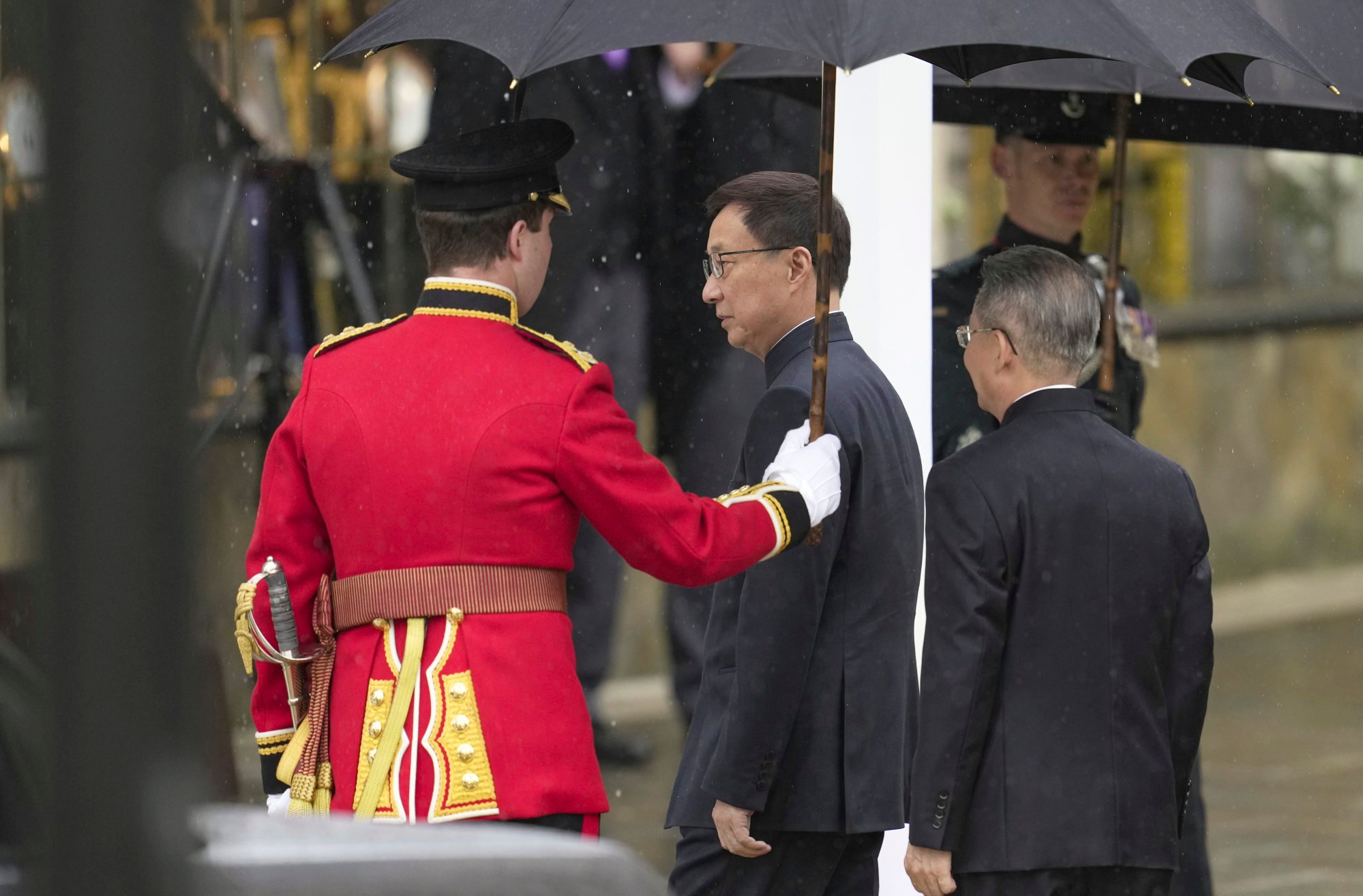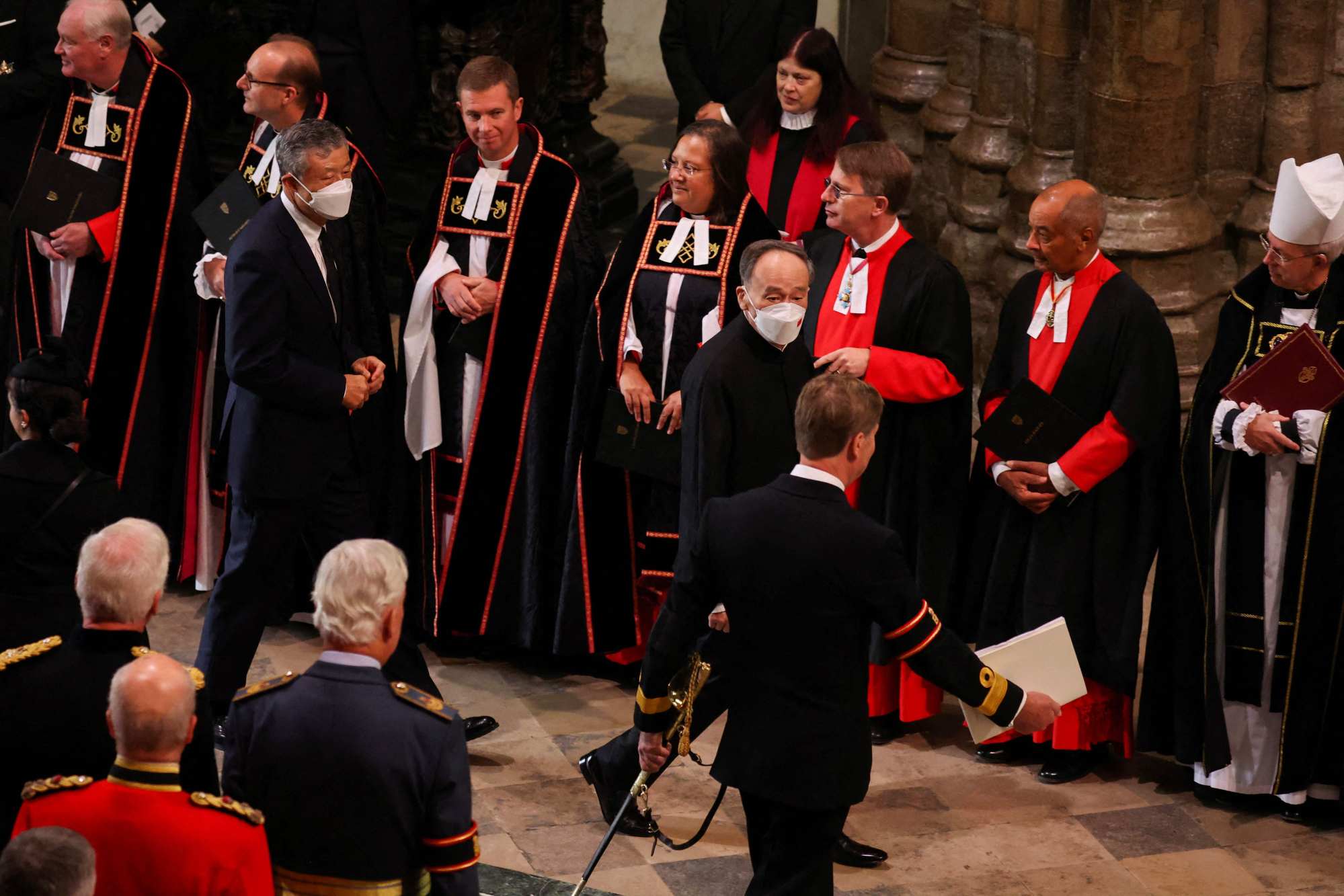
China is ready to work with Britain, Xi Jinping says in message congratulating King Charles on coronation
- The message comes as Britain’s leaders try to reset the relationship with Beijing after years of heightened tensions
- Earlier vice-president Han Zheng met Foreign Secretary James Cleverly, who has said Britain must engage with China despite domestic calls for a tougher line
The message, sent by Xi and his wife Peng Liyuan, also said China is ready to work with Britain to develop a stable and mutually beneficial bilateral relationship.
Britain’s current government is seeking to reset the relationship with China after years of growing tensions.
Xi’s message said the world is undergoing “profound and complex transformations”, and the international community is faced with many unprecedented challenges, according to state news agency Xinhua.
Xi also noted that the two countries, as permanent members of the UN Security Council, should “take a long-term and strategic view to jointly promote the historical trend of peace, development, cooperation and win-win situations”.

“China is willing to work with the British side to enhance people-to-people friendship, expand mutually beneficial cooperation and deepen humanistic exchanges, so that a stable and mutually beneficial China-UK relations can better benefit both countries and the world,” it reads.
“Today with VP Han Zheng, I made plain the UK’s views on Hong Kong, Xinjiang and Taiwan,” Cleverly wrote on Twitter after Friday’s meeting “We also discussed working together on climate change, economic ties and people-to-people links.”
Cleverly, who is trying to arrange a visit to China, said earlier this week he would like to discuss a range of subjects with Han, including areas where Britain has “points of criticism”.
The meeting on the sidelines might send a sign about a possible reset of the relationship between the two countries, according to Yu Jie, a senior China research fellow at the Chatham House think tank.
“Yet the fundamental challenges within UK-China relations remain unchanged; issues over Hong Kong, technology and security and sanctions imposed by both sides,” she said.
While the leaders of France, Germany and Spain have visited China in recent months and called for more engagement, senior British leaders have not met their Chinese counterparts in person since 2018 and aligned themselves with the United States in taking a tough stance on China.
When asked at a regular press conference on Thursday whether Cleverly would be invited to visit in the near future, Chinese foreign ministry spokeswoman Mao Ning did not answer the question, only saying China was always open to dialogue and exchange.
“However, to have any dialogue there must be mutual respect,” Mao said, adding that the two sides must be willing to meet each other halfway.
According to Yu, “Beijing is firmly convinced that the UK is in close coordination on its China position with Washington and in no hurry to invite a senior Tory minister to visit until US-China tension begins to ease.”
Han, in the largely ceremonial role of vice-president, is not a bad choice for Beijing to send to this event given the state of the relationship, said Kerry Brown, director of the Lau China Institute and professor of Chinese studies at King’s College London.
“The simple geopolitical reality is that Britain is a much smaller and weaker interlocutor with China than even a few years ago. It needs to work in alliance in order to have any chance of properly influencing China,” said Brown.
“Britain, despite the shrill voices of the hawks, needs to have workable relations with China.”

However, some members of the ruling Conservative Party have criticised Han’s attendance because of his previous role as head of the central leading group on Hong Kong and Macau affairs during the 2019 protests and imposition of the national security law.
At a welcome dinner hosted by members of the Chinese and British business community in London on Thursday, Han issued a goodwill message calling for a joint effort to improve relations.
“China views Britain’s international role and influence from a positive perspective and always treats the country as a strategic partner,” he said.
Cui Hongjian, a specialist in European studies at the China Institute of International Studies, said there are two preconditions before Beijing extends an invitation to senior members of the British government: reaching a consensus on some issues and working out a list of substantial areas for cooperation.
“It is pointless to arrange a visit just for the sake of visiting if it can be predicted that it will be unproductive,” Cui said. “When the two conditions are met, the resumption of high-level exchanges is just a matter of time.”
In an annual review of Britain’s national security strategy published in March, Prime Minister Rishi Sunak defined China as an “epoch-defining and systemic challenge” rather than a “threat” – despite calls for a tougher stance from the more hawkish members of his Conservative Party.
Echoing that, Cleverly in a speech to business leaders last week said it would be a “betrayal” of Britain’s national interest to “declare some kind of new cold war and say that our goal is to isolate China”, adding that the country “must engage with China where necessary and be unflinchingly realistic about its authoritarianism”.
Yu said judging from the softer tone of both speeches, Sunak and Cleverly were on track to reset the country’s China policy agenda and reduce the influence of their hawkish backbenchers.
Cui agreed, saying: “Cleverly’s speech demonstrated both that he has the intention to increase exchanges with China and that there are still obstacles within Britain to doing so”.

“Obviously, we have been through some difficult headwinds in the relationship over the past four or five years. I think we are looking to lean back into a constructive engagement to see where we can collaborate,” Davidson said.
Wang noted that Britain’s economic performance was worse than that of other major Western countries, which had prompted a push – especially within the financial and business sectors – to fix the relationship with China.
“Britain’s competitiveness has been weakened the most by the impact of the Ukraine war, so they are more anxious than before to seize development opportunities in China to make up for it. China should take this chance, too.”
Additional reporting by Vanessa Cai


